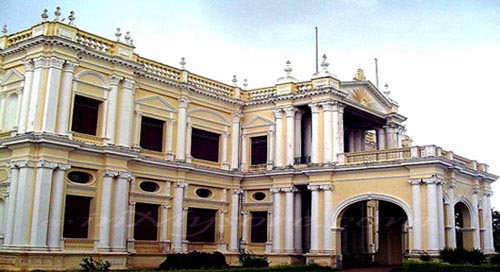Jayalakshmi Vilas Mansion

Information on Jayalakshmi Vilas Mansion (Mysore, Karnataka) - History & Architecture
Jayalakshmi vilas palace, is located in the heart of the Mysore city, and the location of the vilas is surrounded with the flourishing greenery of Manasagangotri, is a grand,attractive and old fashioned mansion. It rises on a hummock on the west side of the lake named Kukkarahalli Kere. The mansion also owns the museum, where there are assortments of artifacts, which are incalculable.
Jayalakshmi Vilas Mansion Architecture
The Jayalakshmi vilas mansion built by the Maharaja Chamaraja Wodeyar, for his eldest covers an area of 6 acres with 125 rooms, 300 windows, and 287 imprinted doors with great modification. This three department building consists of a dancing hall, Kalyana Mantap and luminously festooned rooms. The dancing hall in the mansion has a inexpressive wooden flooring and its covering or the roof is adorned with highlighted glasses. The Kalyana Mantap in other hand is a quadrangle supported by 12 pillars ascends by 8 petal fashioned vaults which has been covered with highlighted glass. In the north side of the mansion has a monument of Goddess Lakshmi, whereas in the south of the Mansion has a statuette of Goddess Bhuvaneshwari. The heart or the centre of the Jayalakshmi Vilas Mansion is bedecked with wooden and carvings of stonework. High roof of the Jayalakshmi Vilas Palace is decorated with highlighted glasses. The palace also consists of a gold-plated surpass acknowledged as the "Kalasha". Although the front of the mansion is engraved from the pinnacle which constitutes an outstanding 40 feet high function antechamber and the concluding half is enclosed with carved vault. The entire mansion is constructed of block elements or bricks, field gun, timber and iron. For the rainwater and the used water to flow, there is a separate waterway arrangement done. The mansion consists of a three-wing structure that gives the features of a progression of Corinthian and iconic design. The foremost floor of the building or mansion consists of imperial pediments on the crown top.
Jayalakshmi Vilas Mansion History
During the period of Krishnaraja Wodeyar 4, the mansion came into being; it was in the years of 1905. The mansion was built for the eldest daughter Jayalakshmi Ammani by Maharaja Chamaraja Wodeyar. The entire mansion cost was 7 lakhs and 1.17 was spent to reinstate it. The location for the mansion was preferred, to be on the hillock, as it is built. The mansion in the beginning was known as the First Rajkumari mansion.
The groundwork stone was laid by her highness Sri Kempananjammanni Avaru, in 1901, in the month of November. Nevertheless the mansion was completed in 1905. However the restoration of the mansion got completed in 2006, with the fund support provided by Infosys.
Later University of Mysore acquired it, and established a postgraduate centre in the campus which was known as Manasagangotri. In the year 2006 an Archeological and folklore museum was established, where the folk art, crafts from all-around Karnataka is exhibited.
Jayalakshmi Vilas Mansion Tourism Importance
From tourism point of view, the Jayalakshmi Vilas Mansion is popular among tourists for its historical importance and the grandeur look, which carries the same importance even today as it used to. The historical museum which has huge collection of ancient antiques and artifacts, truly worth looking at while visit to a Jayalakshmi Vilas Mansion. More of all, it also gives an insight beauty of the rich culture of the era and the historical significance which has been well preserved over the years for one and all to see and relish in.
- Bangalore Monuments
- Bagalkot Monuments
- Belgaum Monuments
- Bellary Monuments
- Bidar Monuments
- Bijapur Monuments
- Chitradurga Monuments
- Coorg Monuments
- Dakshina Kannada Monuments
- Gadag Monuments
- Gulbarga Monuments
- Hassan Monuments
- Mysore Monuments
- Raichur Monuments
- Uttara Kannada Monuments
- Yadgir Monuments
- Andaman Nicobar Monuments
- Andhra Pradesh Monuments
- Assam Monuments
- Bihar Monuments
- Chhattisgarh Monuments
- New Delhi Monuments
- Goa Monuments
- Gujarat Monuments
- Haryana Monuments
- Himachal Pradesh Monuments
- Jammu and Kashmir Monuments
- Karnataka Monuments
- Kerala Monuments
- Madhya Pradesh Monuments
- Maharashtra Monuments
- Odisha Monuments
- Punjab Monuments
- Rajasthan Monuments
- Tamil Nadu Monuments
- Telangana Monuments
- Uttar Pradesh Monuments
- West Bengal Monuments